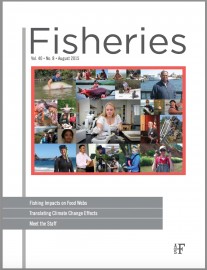President: Tyson Morrill
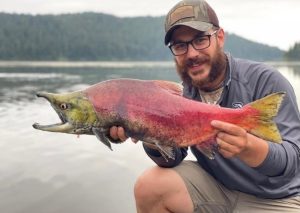 Tyson Morrill grew up and still resides in the Lakes Region of New Hampshire where fishing, hunting, and trapping sparked a curiosity for the outdoors. A naturalist mentality grew while working seasonally in fisheries techniques while pursuing a B.S. in Fisheries & Wildlife Sciences with a Wildlife focus from Paul Smith’s College in New York’s Adirondack mountains. Tyson’s early career focused on human-wildlife conflict mitigation and disease monitoring ranging from Alaska to Vermont before transitioning to fisheries research back in New Hampshire. Along the White Mountains, he established a long-term ecological monitoring project studying wild Brook Trout movement and demographics prior to culvert barrier removal, leading to a M.S. in Biology and ArcGIS certificate from Plymouth State University. His project management grew while directing the regional Conservation program on ‘Golden Pond’ (Squam Lakes) which ranged from year-round water quality monitoring, to dive crews removing invasive milfoil. At present, Tyson is the Restoration Project Manager at the Merrimack River Watershed Council where he implements projects focusing on source water protection, riparian restoration, and a growing focus on large-scale fish passage challenges across NH and MA. Becoming a liaison between adverse stakeholders within both professional and volunteer roles has produced a unique skillset that he utilizes to promote an appreciation for nature, and enact change. In his free time, Tyson volunteers as a Representative on the Pemigewasset River Local River Advisory Committee, Director of the NH Trappers Association, and serves on the Governor’s Commission for the Humane Treatment of Animals; and remains immersed in every New England season- foraging for edible plants, gardening, harvesting wild game, and chasing the ‘big one’ while ice fishing during the winter months.
Tyson Morrill grew up and still resides in the Lakes Region of New Hampshire where fishing, hunting, and trapping sparked a curiosity for the outdoors. A naturalist mentality grew while working seasonally in fisheries techniques while pursuing a B.S. in Fisheries & Wildlife Sciences with a Wildlife focus from Paul Smith’s College in New York’s Adirondack mountains. Tyson’s early career focused on human-wildlife conflict mitigation and disease monitoring ranging from Alaska to Vermont before transitioning to fisheries research back in New Hampshire. Along the White Mountains, he established a long-term ecological monitoring project studying wild Brook Trout movement and demographics prior to culvert barrier removal, leading to a M.S. in Biology and ArcGIS certificate from Plymouth State University. His project management grew while directing the regional Conservation program on ‘Golden Pond’ (Squam Lakes) which ranged from year-round water quality monitoring, to dive crews removing invasive milfoil. At present, Tyson is the Restoration Project Manager at the Merrimack River Watershed Council where he implements projects focusing on source water protection, riparian restoration, and a growing focus on large-scale fish passage challenges across NH and MA. Becoming a liaison between adverse stakeholders within both professional and volunteer roles has produced a unique skillset that he utilizes to promote an appreciation for nature, and enact change. In his free time, Tyson volunteers as a Representative on the Pemigewasset River Local River Advisory Committee, Director of the NH Trappers Association, and serves on the Governor’s Commission for the Humane Treatment of Animals; and remains immersed in every New England season- foraging for edible plants, gardening, harvesting wild game, and chasing the ‘big one’ while ice fishing during the winter months.
Email: [email protected]
Phone: (978) 655-4742, x704
Vice President: Rosanne MacFarlane
Past President: Russell H Easy PhD, MSc.
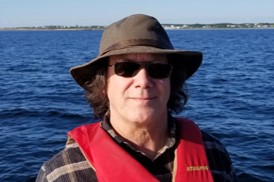 I am a comparative biologist with broad research interests. I first completed a pure sciences diploma at CÉGEP, and then a degree in biochemistry at Algonquin college, was a registered microbiologist at the Canadian College of Microbiology, and have a bachelor’s degree from Carleton University. I have a Master’s degree from St. Mary’s and a Ph.D. from Dalhousie University. I began my scientific career as a biologist with Health Canada in Ontario where I worked with bacterial pathogens in the molecular characterization of toxin and antibiotic resistance genes. I then moved to Winnipeg where I helped establish the molecular diagnostics lab at the Canadian Science Centre for Human and Animal Health. My passion, however, is marine science so I accepted a position with the National Research Council – Institute for Marine Biosciences (NRC-IMB) in Halifax, where I was involved in research exploring fish pathogens. When the department’s focus changed I left my Government position to continue research in marine animals and to teach. As an Associate Professor at Acadia University, I have been very successful in acquiring funding for the numerous research projects which I have established. I have a dynamic lab that includes collaborations with national, international, industrial and academic partners. The current focus of research in The Easy Lab is exploring molecular mechanisms of stress in animals. I serve as the Acadia Honours program coordinator, the Bon Portage field course co-coordinator and am the Chair for Science Atlantic Biology. I also have a passion for science education and have presented public lectures to students of all ages for more than 20 years. In the past I served as Program Director for a major music festival for several years and presently am an avid kayaker and musician.
I am a comparative biologist with broad research interests. I first completed a pure sciences diploma at CÉGEP, and then a degree in biochemistry at Algonquin college, was a registered microbiologist at the Canadian College of Microbiology, and have a bachelor’s degree from Carleton University. I have a Master’s degree from St. Mary’s and a Ph.D. from Dalhousie University. I began my scientific career as a biologist with Health Canada in Ontario where I worked with bacterial pathogens in the molecular characterization of toxin and antibiotic resistance genes. I then moved to Winnipeg where I helped establish the molecular diagnostics lab at the Canadian Science Centre for Human and Animal Health. My passion, however, is marine science so I accepted a position with the National Research Council – Institute for Marine Biosciences (NRC-IMB) in Halifax, where I was involved in research exploring fish pathogens. When the department’s focus changed I left my Government position to continue research in marine animals and to teach. As an Associate Professor at Acadia University, I have been very successful in acquiring funding for the numerous research projects which I have established. I have a dynamic lab that includes collaborations with national, international, industrial and academic partners. The current focus of research in The Easy Lab is exploring molecular mechanisms of stress in animals. I serve as the Acadia Honours program coordinator, the Bon Portage field course co-coordinator and am the Chair for Science Atlantic Biology. I also have a passion for science education and have presented public lectures to students of all ages for more than 20 years. In the past I served as Program Director for a major music festival for several years and presently am an avid kayaker and musician.
Associate Professor
Acadia Biology Honours Coordinator https://biology.acadiau.ca/honours-program.html
Coordinator Bon Portage Field Course: https://biology.acadiau.ca/BonPortage.html
Chair Biology Science Atlantic: https://scienceatlantic.ca/
Director The Blue Dream Project: http://www.thebluedreamproject.org/
Department of Biology
Acadia University, Wolfville, NS B4P 2R6
Ph: +1 (902) 585-1156
Fax: +1 (902) 585-1059
Email: [email protected]
Website: easylab.acadiau.ca
Facebook: www.facebook.com/TheEasyLab
Secretary / Treasurer: Scott Pavey
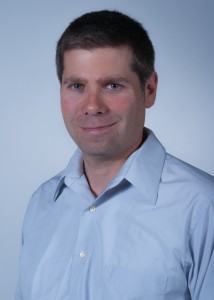
Canada Research Chair and Associate Professor
Department of Biological Sciences
University of New Brunswick • Canadian Rivers Institute, 100 Tucker Park Rd., Saint John, NB E2L4L5 CANADA
T 506 638-2434 Office CRI 129 Lab CRI 215 Email: Scott Pavey [email protected]
University of Maine Student Subunit President: Daison Weedop
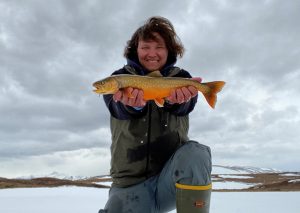 I am a second-year master’s student at the University of Maine in Orono. My research focuses on studying freshwater fish community interactions using food webs constructed with stable isotope data. We worked closely with the Maine Department of Inland Fisheries and Wildlife to sample the fish community in five lakes within Acadia National Park. We also partnered within Purchase College to collect stable isotopes from the bird community nearby these lakes. With my work, I hope to provide useful knowledge to the scientific community and information that will benefit the state of Maine. Previously, at Utah State University, I worked closely with the Fish Ecology Lab studying fish predation in the San Juan River and worked at Toolik Field Station, AK. At Toolik Field Station I studied Arctic Grayling movement and developed a great interest in fisheries science. My experiences at Toolik have motivated me to seek a lifelong career in fisheries sciences.
I am a second-year master’s student at the University of Maine in Orono. My research focuses on studying freshwater fish community interactions using food webs constructed with stable isotope data. We worked closely with the Maine Department of Inland Fisheries and Wildlife to sample the fish community in five lakes within Acadia National Park. We also partnered within Purchase College to collect stable isotopes from the bird community nearby these lakes. With my work, I hope to provide useful knowledge to the scientific community and information that will benefit the state of Maine. Previously, at Utah State University, I worked closely with the Fish Ecology Lab studying fish predation in the San Juan River and worked at Toolik Field Station, AK. At Toolik Field Station I studied Arctic Grayling movement and developed a great interest in fisheries science. My experiences at Toolik have motivated me to seek a lifelong career in fisheries sciences.
If you want to learn more about the UMaine Subunit send us an email at [email protected] and follow us on Facebook at @UMaineAFSStudent
University of New Hampshire Subunit President: Nathan Hermann
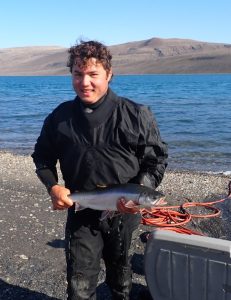 I am currently a Masters student at the University of New Hampshire, but have also accepted an offer to stay for a PhD both advised by Nathan Furey. My current research focuses on understanding the impact of seasonal change on fish movement and feeding ecology using sculpin in the high Canadian Arctic as a model system. I have done so combining summertime diet studies with year-round acoustic telemetry to compare the behavior of fish under sea-ice to those exploiting the pulse of summer resources. My interests in this area stem from my desire to comprehend the often-shrouded lives of fish and aquatic life generally and to advocate for their protection. With my PhD work, I hope to expand my quantitative skillset by incorporating mixed predator-prey interactions into an integrated forecast of the Gulf of Maine community given rapidly advancing climate change in the area. I hope my involvement with AFS can help grant me in-depth experiences with all manner of fish and fisheries researchers and to carry through from theoretical to applied knowledge.
I am currently a Masters student at the University of New Hampshire, but have also accepted an offer to stay for a PhD both advised by Nathan Furey. My current research focuses on understanding the impact of seasonal change on fish movement and feeding ecology using sculpin in the high Canadian Arctic as a model system. I have done so combining summertime diet studies with year-round acoustic telemetry to compare the behavior of fish under sea-ice to those exploiting the pulse of summer resources. My interests in this area stem from my desire to comprehend the often-shrouded lives of fish and aquatic life generally and to advocate for their protection. With my PhD work, I hope to expand my quantitative skillset by incorporating mixed predator-prey interactions into an integrated forecast of the Gulf of Maine community given rapidly advancing climate change in the area. I hope my involvement with AFS can help grant me in-depth experiences with all manner of fish and fisheries researchers and to carry through from theoretical to applied knowledge.
Get in touch with us at: [email protected]
Quebec Student Subunit President: Miguel Eduardo L. Felismino
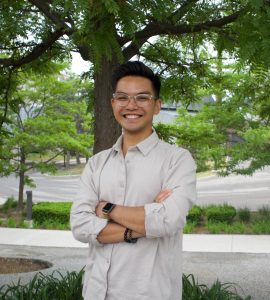 I am a PhD student at McGill University with broad interests in ecotoxicology and freshwater ecology. I am co-supervised by Dr. Irene Gregory Eaves (Biology) and Dr. Nathalie Tufenkji (Chemical Engineering). For my dissertation I am focusing on the degradation and ecotoxicology of plastic films typically used as mulch in agricultural lands. I want to further understand how these plastics can infiltrate aquatic systems and disrupt aquatic communities. Previously, I completed my MSc at Concordia University with Dr. Grant Brown. There, I studied the sublethal effects of polyethylene microplastics on populations of freshwater fish. As is obvious with my academic projects, my passion is in ensuring the health of aquatic systems worldwide and protecting them from anthropogenic pressures. I hope to share my work in both academic and public settings to improve society’s awareness to these issues. My involvement with AFS helps me pursue that passion and be surrounded by people with similar goals.
I am a PhD student at McGill University with broad interests in ecotoxicology and freshwater ecology. I am co-supervised by Dr. Irene Gregory Eaves (Biology) and Dr. Nathalie Tufenkji (Chemical Engineering). For my dissertation I am focusing on the degradation and ecotoxicology of plastic films typically used as mulch in agricultural lands. I want to further understand how these plastics can infiltrate aquatic systems and disrupt aquatic communities. Previously, I completed my MSc at Concordia University with Dr. Grant Brown. There, I studied the sublethal effects of polyethylene microplastics on populations of freshwater fish. As is obvious with my academic projects, my passion is in ensuring the health of aquatic systems worldwide and protecting them from anthropogenic pressures. I hope to share my work in both academic and public settings to improve society’s awareness to these issues. My involvement with AFS helps me pursue that passion and be surrounded by people with similar goals.
If you would like to contact the Quebec Student Subunit Executive Committee, you can reach us at [email protected] or visit http://linktr.ee/afsqc for our social media information.

